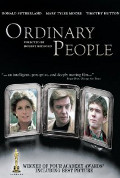
Directed by
Robert Redford
124 minutes
Rated M
Reviewed by
Bernard Hemingway

Ordinary People
Robert Redford's directorial debut won him a Best Director Oscar whilst the film also collected Best Picture and Best Screenplay Oscars and was a huge box office success. Although arguably those trophies should have gone to Raging Bull the choice of Ordinary People was a bold one by the Academy (in a similar mood at the Oscars the previous year Kramer vs Kramer triumphed over Apocalypse Now) because it tackled a down-beat subject in an honest and articulate way. . At times it is a little too ready to overstress the salient points but generally Redford’s understated, character-focussed approach, combined with the fine performances make this an impressive film, ordinariness notwithstanding.Adapted from a novel by Judith Guest it tells the story of well-to-do Illinois couple, Beth and Calvin Jarrett (Mary Tyler Moore and Donald Sutherland) whose younger son Conrad (Timothy Hutton) is wracked by guilt and has attempted suicide after his older brother died in a boating accident for which he blames himself. Beth has withdrawn behind a façade of suburban perfection whilst Calvin, although in his work-life adrift, tries to keep a spirit of bonhomie at home in order to help Conrad and his wife get through.
Hutton deservedly picked up the Best Supporting Actor Oscar for his portrayal of the troubled young man although it was somewhat of an odd nomination as he is in fact the main character (he largely sank out of sight after this). His performance is telling, as is Moore’s as his emotionally uptight mother. Sutherland has the least rewarding role as Calvin is little more than a chronically nice guy. The portrayal of the constant tension as the three try to deal with the collapsing situation feels real however, although, once again, and this typifies Redford’s subsequent directorial style, there is a little too much inclination to the sentimental narrative resolution typical of mainstream American film (the topping and tailing of the film by Pachabel's Canon doesn't help in this regard) to make this feel entirely effective.
Want something different?





